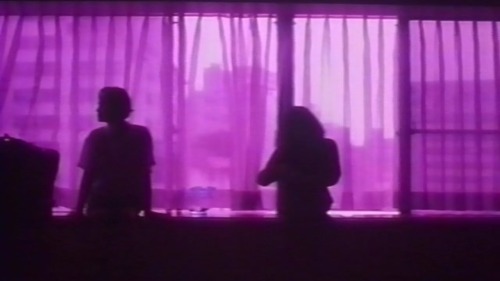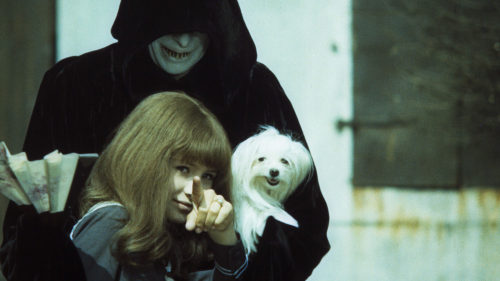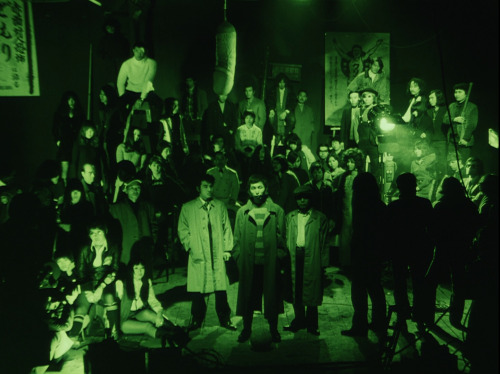#psychedelic film
NEKO-MIMI (1993)
Directed by Jun Kurosawa
Doomsy’s Rating: 87/100
NEKO-MIMI is a film that acts as a slipstream to almost every emotion possible, floating through time and space from elation to enmity. It sets you adrift in a headspace of beauty and darkness, but Jun Kurosawa effortlessly blends the gorgeously grainy lo-fi cinematography with a full spectrum of hues, tints, and colors that extended to every area of the rainbow so that the mind can feel them. The experience stands as more or less a mood ring of a film, changing palette and filming techniques with the unstable emotions of the characters, who remain lost in permanent thought loops that only lead to their irrevocable self-destruction. In terms of experimental avant-garde Japanese cinema, this is right up there for best I’ve seen. A remarkable gem of haunting surrealism.
Post link
The Color of Pomegranates (1969)
Directed by Sergei Parajanov
Doomsy’s Rating: 92/100 (on my Great Films list!)
Serving as an amazing double feature with Valerie and Her Week of Wonders, Sergei Parajanov’s untouchable art-house masterwork The Color of Pomegranates is a one-of-a-kind experience that is an absolute visual feast from start to finish. The film is based on the life of Armenian poet Sayat-Nova, and is told through in a series of tableau set-pieces of rich symbolism and psychedelic mise-en-scene manipulation. A clear influence on several prominent pieces of modern media (namely the music videos for R.E.M.’s “Losing My Religion” and Lady Gaga’s “911″), this is a spoonfeeding of the Armenian oral tradition and its glorious cultural history. Although heavily censored by the Soviet Union against the wishes of Parajanov, likely for its less-than-flattering subtext about the occupation of the Soviets, the film remains a transcendent and enchanting journey through a culture never seen before on film. The use of color, so exquisite in its breadth, is nearly kaleidoscopic and wholly unforgettable. There is a certain patience required for a film like this, as its not a film that is best served in narrative terms, but that should not deter anyone from such an enigmatic and beautiful work. If you like your films a little impenetrable and mysterious, this is a tone poem for the ages.
Watched on Criterion Channel.
Post link
Valerie and Her Week of Wonders (1970)
Directed by Jaromil Jires
Doomsy’s Rating: 97/100 (on my Great Films list!)
Easily the best film I’ve seen this year, Valerie and Her Week of Wonders is a magical and spellbinding surrealist steampunk-goth horror film that will stay with you long after it’s done. Through each phenomenally-staged scene, we follow Valerie, a 13-year-old girl who starts the film Carrie-style with the arrival of her first period. We then watch as her entire world collapses and becomes a psychedelic fantasy land of predatory vampires, salacious fire-and-brimstone priests and the benign witches she befriends to save her from the demons that represent the evils of men. The setting, as oblique as its imagery, is a medieval-inflected Earth of arcane architecture, sinister machines and devils and gods around every corner. The haunting, trippy visuals clash against the peaceful, melodic baroque music to further distort Valerie’s perceptions of herself and the people around her as they literally transform into archetypal objects of Nietzschean and Jungian origin. Good becomes Evil, parents become incestuous beings of carnal lust and boys become monsters capable of heinous lechery. In the same way that puberty is the end of innocence, it also marks the shift in adults from trustworthy caretakers to figures of abandonment and solipsism. If you have any interest in the Czech New Wave, surrealism, or goth shit in general, this is an absolutely stunning piece of work and deserves all the plaudits in the world for being such a singular experience. Wow!
Watched on Criterion Channel.
Post link
I Never Promised You a Rose Garden (1977)
Directed by Anthony Page
Doomsy’s Rating: 63/100
I’ve praised the production talents of Roger Corman, the exploitation film maestro who single-handedly invented the grindhouse genre, many times before on this blog. Well, I never thought I’d see him go so far as to make a sleazy film set in a mental hospital with ambitions well beyond its genre. This is one strangefilm. In fact, I can’t say I’ve seen many like it. Kathleen Quinlan, who would later become a character actress of quite some brilliance (in films such as Event Horizon andThe Hills Have Eyes remake) plays a girl named Deborah who by the looks of modern psychiatry, seems to suffer from a psychotic and dissociative disorder. She spends most of this film’s 90 minutes strapped to a bed in a mental institution, lost in a haze of delusion and suicidal ideation. Bibi Andersson, best known as Ingmar Bergman’s muse, is her sympathetic doctor (hilariously named Dr. Fried) and together they must help poor Deborah out of her psychoses. And honestly, that’s pretty much it.
First thing to say is, from a present-day perspective this is one seriously depraved affair. I couldn’t help but wonder if this was made by Corman as a quick cash-in on the heels of One Flew Over the Cuckoo’s Nest, and while that certainly is likely, I Never Promised You a Rose Garden is an entirely different beast. While Forman’s film was concerned with the tragic nature of the McMurphy character and his battle with Nurse Ratched, director Page and Corman seem less concerned with narrative and more with histrionic art-house surrealism in the vein of Ken Russell. And boy, is this sordid tale trippy. The hallucinatory scenes are jarring and often-times overwhelming, calling to mind certain scenes from Dennis Hopper’s The Trip and Bergman’s The Seventh Seal. I’d also be remiss if I didn’t call attention to the bizarre casting. In supporting roles, we find Danny Elfman (!) leading some weird Monty Pythonesque knights haunting the protagonist, Mel Gibson and Dennis Quaid as baseball players in dream sequences, and Lorraine Gary (Mrs. Brody from Jaws)playing the main character’s self-absorbed mother. Oh, and Reni Santoni (RIP) as one of the most evil orderlies this side of Ben Stiller in Happy Gilmore.
Beyond the simplistic narrative, there’s a not-so-surprising amount of exploitation content in the film’s mental hospital setting, some of which is inappropriately played for laughs, but most of the rest is relegated to frankly disturbing scenes of human suffering. Most of the time, when Hollywood tackles subjects like severe mental illness and long-term hospitalizations, there is a certain artifice only possible when audience attention spans are in the forefront of the producer’s minds. Most viewers who view this will be stunned to find the lack of characterization and narrative more indicative of a documentary, the camera merely observational and the message being one of understanding and empathy.
The film this reminds me most of is Allan King’s docudrama Warrendale, which at ten years older, had the benefit of being a much more shocking experience. What Page and Corman bring to the catalog of suffering is more up-close-and-personal and exhausting than King, who brought a more detached filmmaking style. I think beyond the hysteria and shrill insanity that pervades most of this film’s runtime, there is something interesting going on here. I’m just not sure what it is. I did have a bit of a headache after finishing this, but that could have just been the copious amount of weed and vodka I had just consumed. Who knows.
Post link
Throw Away Your Books, Rally in the Streets (1971)
Directed by Shuji Terayama
Doomsy’s Rating: 98/100 (on my Great Films list!)
An undying punk manifesto: The faces spit on, burned onto celluloid forever. Terayama’s magnum opus, a scathing and incendiary battle cry for the disenfranchised and downtrodden. Never lost, never forgotten, these are the words spoken by those too obscure to hear. But here, and if only here, can they be heard with every desperate plea for change. The anger in this film could burn down the world, so full of resentment towards adults, towards authority, and towards oppression it will likely never be matched. The incomparable visual aesthetic is guerrilla, gutsy, and unapologetic, so steadfastly eager to capture the justifiable rage of the loners, the losers, the punks, the LGBT community, all those society has shit upon for far too long. Makes an excellent trilogy of the Japanese underground with Toshio Matsumoto’s Funeral Parade of Roses and Yoshihiko Matsui’s Noisy Requiem. Essential viewing for outsiders everywhere.
Post link





